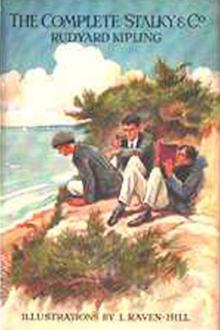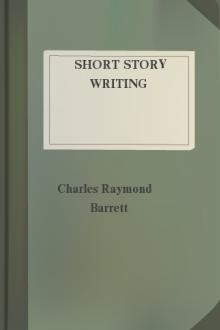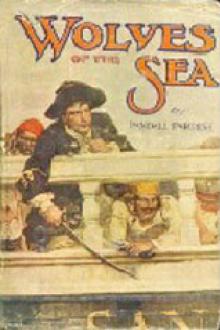Genre Fiction. Page - 207

wn account; and it was the cautious Stalky who found the track of his pugs on the very floor of their lair one peaceful afternoon when Stalky would fain have forgotten Prout and his works in a volume of Surtees and a new briar-wood pipe. Crusoe, at sight of the footprint, did not act more swiftly than Stalky. He removed the pipes, swept up all loose match-ends, and departed to warn Beetle and McTurk.
But it was characteristic of the boy that he did not approach his allies till he had met and conferred with little Hartopp, President of the Natural History Society, an institution which Stalky held in contempt, Hartopp was more than surprised when the boy meekly, as he knew how, begged to propose himself, Beetle, and McTurk as candidates; confessed to a long-smothered interest in first-flowerings, early butterflies, and new arrivals, and volunteered, if Mr. Hartopp saw fit, to enter on the new life at once. Being a master, Hartopp was suspicious; but he was also an enthusiast, and his gentle little soul h

omentary return to the Fool'sestate from which I thought myself on the point of being for ever freed.
"I shall use the interview to induce his Excellency to submit a tenthbeatitude to the approval of our Holy Father: Blessed are the bearers ofgood tidings. Come on, Messer the seneschal."
I led the way, in my impatience forgetful of his great paunch and littlelegs, so that he was sorely tried to keep pace with me. Yet who wouldnot have been in haste, urged by such a spur as had I? Here, then, wasthe end of my shameful travesty. To-morrow a soldier's harness shouldreplace the motley of a jester; the name by which I should be known againto men would be that of Lazzaro Biancomonte, and no longer Boccadoro--theFool of the golden mouth.
Thus much had Madonna Lucrezia's promises led me to expect, and it waswith a soul full of joyous expectation that I entered the great man'scloset.
He received me in a manner calculated to set me at my ease, and yet therewas about him a something that overa

ah!" Jensen snorted contemptuously. "I can take care of myself. I know what I'm doin', I tell you."
"You may, but you don't act like it," was Wade's parting remark, as he turned his horse and rode off.
"Go to hell!" the Swede shouted after him.
Heading toward Crawling Water, the ranch owner rode rapidly over the sun-baked ground, too full of rage to take notice of anything except his own helplessness. The sting of Jensen's impudence lay in Wade's realization that to enlist the aid of the sheriff against the sheep man would be very difficult, if not altogether impossible. There was very little law in that region, and what little there was seemed, somehow, to have been taken under the direction of Race Moran.
It was now broad day and the prairie warmed to the blazing sun. Long, rolling stretches of grass, topped with rocks and alkaline sand, gave back a blinding glare like the reflection of a summer sea, from which arose a haze of gray dust like ocean mists over distant reaches. Far

assassination plot, and were as vehement of their denunciations of its authors as were the Whigs, remained staunch in their fidelity to "the king over the water," maintaining stoutly that his majesty knew nothing whatever of this foul plot, and that his cause was in no way affected by the misconduct of a few men, who happened to be among its adherents.
At Lynnwood things went on as usual. Charlie continued his studies, in a somewhat desultory way, having but small affection for books; kept up his fencing lesson diligently and learned to dance; quarrelled occasionally with his cousin Alured, spent a good deal of his time on horseback, and rode over, not unfrequently, to Rockley, choosing, as far as possible, the days and hours when he knew that Alured and his father were likely to be away. He went over partly for his own pleasure, but more in compliance with his father's wishes.
"My cousin seldom comes over, herself," the latter said. "I know, right well, that it is from no slackness of her own,

u to the death."
He had no answer for this. It was true. He had been brought up in a land of Indian wars and he had accepted without question the common view that the Sioux, the Crows, and the Cheyennes, with all their blood brothers, were menaces to civilization. The case for the natives he had never studied. How great a part broken pledges and callous injustice had done to drive the tribes to the war-path he did not know. Few of the actual frontiersmen were aware of the wrongs of the red men.
The young man's hands fell from her arms. Hard-eyed and grim, he looked her over from head to foot. The short skirt and smock of buckskin, the moccasins of buffalo hide, all dusty and travel-stained, told of life in a primitive country under the simplest and hardest conditions.
Yet the voice was clear and vibrant, the words well enunciated. She bloomed like a desert rose, had some quality of vital life that struck a spark from his imagination.
What manner of girl was she? Not by any possibil

what has been said it is evident that the short story is artificial, and to a considerable degree unnatural. It could hardly be otherwise, for it takes out of our complex lives a single person or a single incident and treats that as if it were complete in itself. Such isolation is not known to nature: There all things work together, and every man influences all about him and is influenced by them. Yet this separation and exclusion are required by the conventions of the short story; and after all, there is always the feeling, if the characters are well handled, that they have been living and will continue to live, though we have chanced to come in contact with them for only a short time.
It is this isolation, this magnifying of one character or incident, that constitutes the chief difference between the novel and the short story.[8] In the novel we have a reproduction of a certain period of real life: all the characters are there, with their complex lives and their varying emotions; there are varied sce

of bark he had a fire blazing upon the snow by the time the dog mail drew up with its unconscious burden. While the driver was loosening Wabi's clothes and bundling him in heavy bearskins Rod added dry limbs to the fire until it threw a warm glow for a dozen paces around. Within a few minutes a pot of ice and snow was melting over the flames and the courier was opening a can of condensed soup.
The deathly pallor had gone from Wabi's face, and Rod, kneeling close beside him, was rejoiced to see the breath coming more and more regularly from between his lips. But even as he rejoiced the other fear grew heavier at his heart. What had happened to Minnetaki? He found himself repeating the question again and again as he watched Wabi slowly returning to life, and, so quickly that it had passed in a minute or two, there flashed through his mind a vision of all that had happened the last few months. For a few moments, as his mind traveled back, he was again in Detroit with his widowed mother; he thought of the

rack out o' this just about the quickest the law allows! Yes, I DO, now!"
"Wonderful! Marvellous! Incredible! That rara avis, an exception to all exceptions!" declared the professor, more deeply stirred than either of his nephews had ever seen him before. "A genuine tornado which has no eastern drift; which heads as directly as possible towards the northwest, and at the same time--incredible!"
Only ears of his own caught these sentences in their entirety, for now the storm was fairly bellowing in its might, formed of a variety of sounds which baffles all description, but which, in itself, was more than sufficient to chill the blood of even a brave man. Yet, almost as though magnetised by that frightful force, the professor was holding his air-ship steady, loitering there in its direct path, rather than fleeing from what surely would prove utter destruction to man and machine alike.
For a few moments Bruno withstood the temptation, but then leaned far enough to grasp both hand and tiller,

on. Theshuffling of feet, the rattling of chains, the harsh voices of theguard, made it impossible to distinguish any words passing between thetwo. I could only watch them, quickly assured that I had likewiseattracted the girl's attention, and that her gaze occasionally soughtmine. Then the guards came to me, and, with my limbs freed of fetters,I was passed down the steep ladder into the semi-darkness betweendecks, where we were to be confined. The haunting memory of her faceaccompanied me below, already so clearly defined as to beunforgettable.
It proved a dismal, crowded hole in which we were quartered like somany cattle, it being merely a small space forward, hastily boxed offby rough lumber, the sides and ends built up into tiers of bunks, theonly ventilation and light furnished by the open hatch above. Theplace was clean enough, being newly fitted for the purpose, but wastotally devoid of furnishings, the only concession to comfort visiblewas a handful of fresh straw in each bunk. The m

ssor, and Andy Sudds went off on occasional hunting trips.
But the spirit of adventure was still strong in the hearts of the boys and the professor. One day, in the midst of some risky experiments at college, Jack and Mark, as related in "Through Space to Mars," received a telegram from Professor Henderson, calling them home.
There they found their friend entertaining as a guest Professor Santell Roumann, who was almost as celebrated as was Mr. Henderson, in the matter of inventions.
Professor Roumann made a strange proposition. He said if the old scientist and his young friends would build the proper kind of a projectile, they could make a trip to the planet Mars, by means of a wonderful motor, operated by a power called Etherium, of which Mr. Roumann held the secret.
After some discussion, the projectile, called the Annihilator, from the fact that it annihilated space, was begun. It was two hundred feet long, ten feet in diameter in the middle, and shaped like a cigar. I